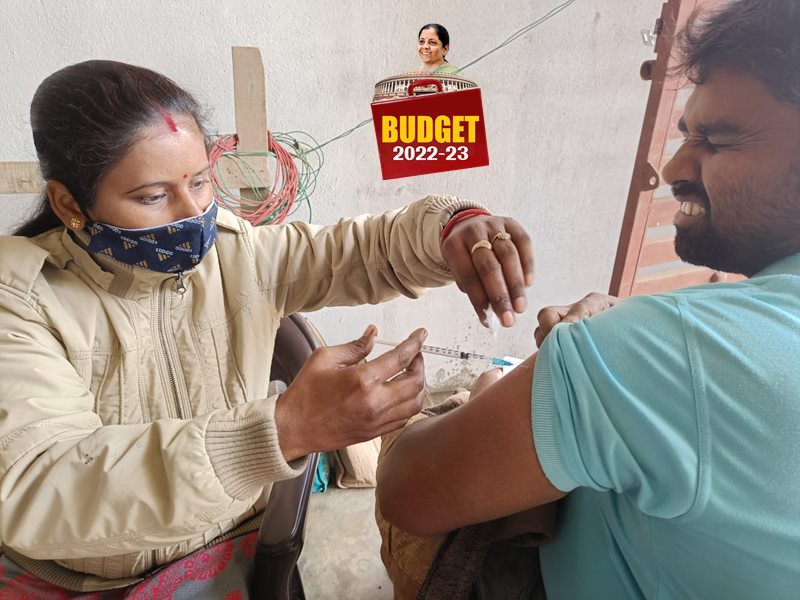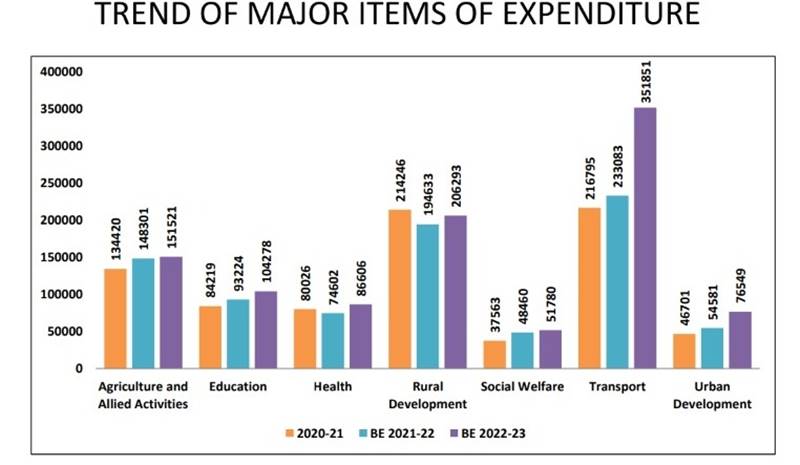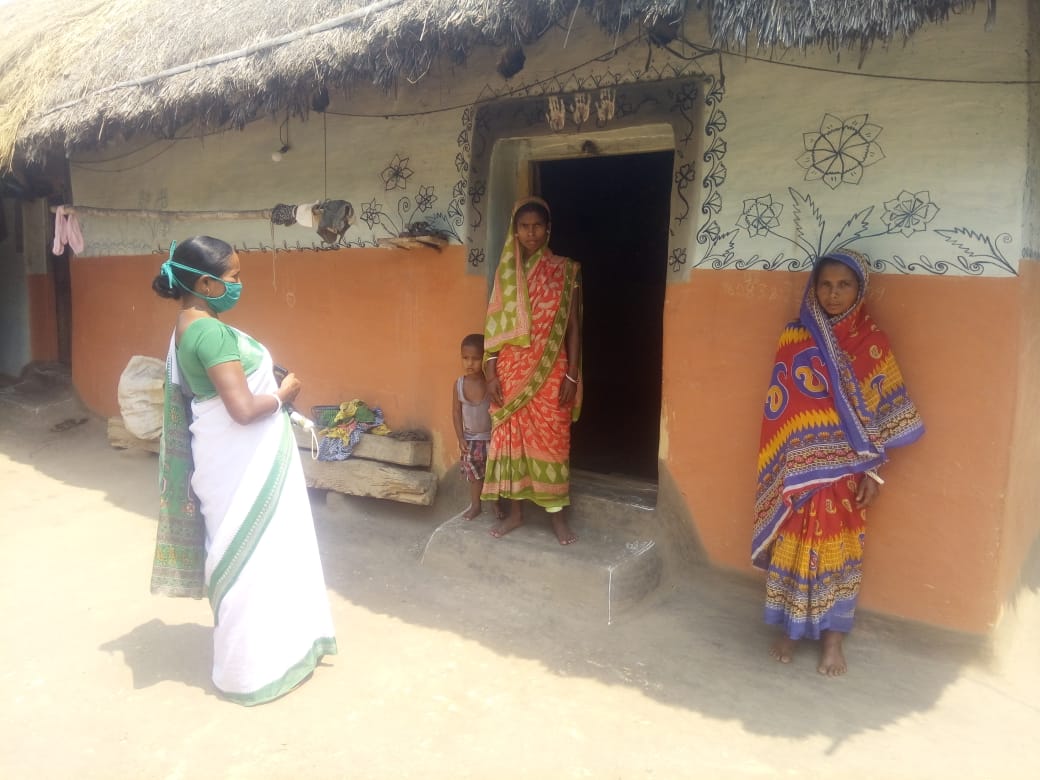Health Budget 2022 “falls flat”, share of health in total budget drops to 2.26%: Jan Swasthya Abhiyan
Public health experts have demanded an increase in the health outlay. They claim the budget has failed to allocate sufficient funds for the strengthening of the public health system, the National Health Mission programme, COVID related provisions, health services for women and children, and the mental health programme.


A health worker vaccinating villager against COVID19 in Lucknow district, Uttar Pradesh. Photo: Abhishek Verma
Upset with the outlay for healthcare in the Union Budget 2022-23, Jan Swasthya Abhiyan (JSA), a people’s movement working for health rights, has strongly opposed the low fund allocation and has demanded “essential” and higher allocations for public health required during the COVID19 pandemic and beyond. This, the group believes, is to ensure adequate healthcare for all.
The Budget Estimate 2022-23 has allocated Rs 86,606 crore to the health sector, which is a “negligible” increase as compared to the Revised Estimate of Rs 85,915 crore for FY 2021-22, say health experts.

According to the Jan Swasthya Abhiyan, the share of health in the total budget has declined from 2.35 per cent in budget 2021-22 to 2.26 per cent in the current budget.
This shows the Union government has reduced its priority towards the health sector, complain the right to health researchers.
“The Union Health budget 2022-23 falls flat because it has completely overlooked the lessons of the Covid-19 epidemic and fails to allocate much-needed increase in allocations for public health system strengthening, the major National Health Mission programme, COVID related provisions, services for women and children, Mental health programme,” read the statement released by JSA public health experts today, February 2.
Meanwhile, Union Health Minister Mansukh Mandaviya said “this budget will prove to be effective in making a self-reliant India.”
Also Read: Health sector gets Rs 86,606 crore in Budget 2022; public health experts say “not enough”
Where is COVID care?
Interestingly there is no mention for Budget Estimates for India’s COVID19 Emergency Response and Health System Preparedness Package in FY 20212-22. The Union Budget 2022 only documented Rs 12,359 as revised estimates for FY 2021-22.
The allocation for the insurance cover for health workers for COVID response under Pradhan Mantri Garib Kalyan Package has decreased from RE of Rs 813.60 crores in 2021-22 to Rs 226 crores in FY 2022-23.
“Is the government assuming that there is now no need to make provisions for care related to the COVID pandemic, even though cases continue across the country?” asked public health experts in their statement issued today, February 2.
Last year, Rs 35,000 crore was allocated towards COVID19 vaccination. It has now been drastically cut, pointed out the JSA health experts, as a result the public resources may fall short in achieving the goal of vaccinating all against COVID19, particularly future vaccination needs and vaccination for children are taken into account.
“It seems that now the Government’s policy would be that the private sector hereafter will be the main source of covid vaccines,” stated the JSA health experts.

Lauding frontline health workers by Budget cuts?
Amid the COVID19 pandemic, frontline health workers including Accredited Social Health Activists (ASHA), Auxiliary Nurse Midwives (ANMs), and anganwadi workers have played a vital role braving multiple obstacles, salary cuts, and delayed payments. Often working without protective gear equipment during field visits to COVID19 patients in rural areas.
Public health experts point out there have hardly been any steps taken to improve fair compensations and wages for these dedicated health workers.
The provision to provide insurance coverage in case of death of health workers has been reduced from Rs 813 crores in revised estimate 2021-22 to Rs 226 crores in FY 2022-23.
It is to be noted that the success of the country’s largest vaccination campaign is based on the relentless efforts of ASHA workers and other frontline health workers. The Budget Estimates for the National Health Mission have been increased by 1.8 per cent from Rs 37,130 crores in FY 2021-22 to Rs 37,800 crores in 2022-23.
“This budget is going to considerably affect the compensations to ASHAs and ANMs,” stated public health experts.
Also Read: If children could vote: In poll-bound UP, high malnourishment but 66% POSHAN funds unutilised
How concerned is the govt about people’s mental health?
Although a special National Tele Mental Health Program has been announced to provide better access to quality mental health care, the existing National Mental Health Programme (NMHP) continues to face neglect, pointed out JSA. The NMHP has received an allocation of Rs 40 crores, which continues to be the same since 2019-20. This amounts to spending Rs 0.30 per person per year.
The government is trying to fill major gaps in services on the ground just by relying on a tele-medicine programme. This will invariably mean that a large section of the society would continue to be deprived of quality mental health care, stated public health experts.
‘Digital models a priority while actual healthcare suffers’
The Budget for Ayushman Bharat Digital Health Mission has been increased from Rs 30 crores allocated in the previous year to Rs 200 crores for 2022-23 — almost seven times increase in one year.
Under Ayushman Bharat Digital Mission, every citizen is expected to get a health identity card. The health record will be digitally secure.
The public health experts say this amounts to placing undue emphasis on ‘Health cards’ while neglecting actual ‘Health care’.
“Government’s fascination to create electronic health records in the middle of a pandemic, while neglecting the actual public healthcare delivery system raises serious doubts about the main intentions of the program. It is highly likely that this scheme is going to benefit the big IT companies and commercial health insurance companies while the safety and security of personal information remain doubtful,” said public health experts.

